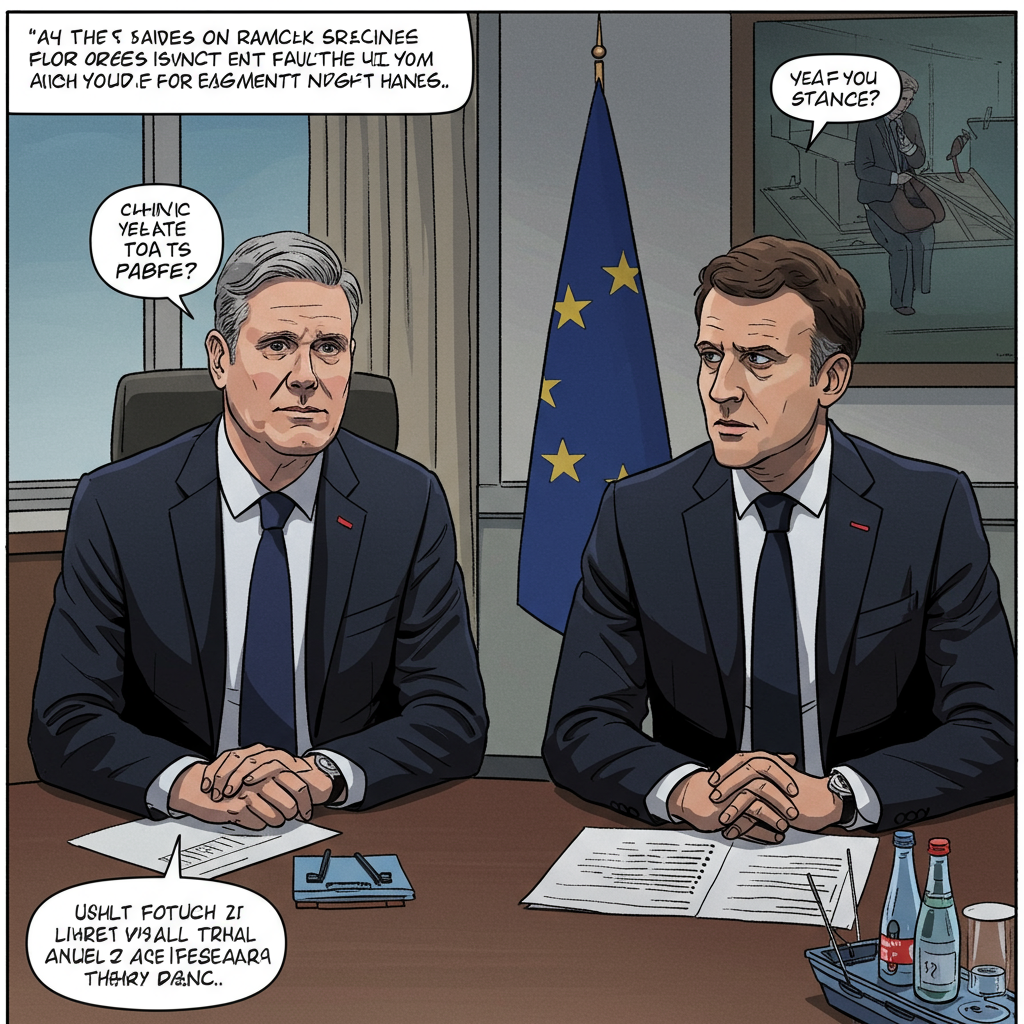Amidst rising numbers of dangerous English channel crossings, the UK and france are pushing for significantly enhanced cooperation. french President Emmanuel Macron, during a state visit to the UK, declared both nations “will deliver” on efforts to halt the flow of small boats. These high-level talks with UK leaders, including Labour leader Keir Starmer, aim to finalize agreements strengthening border enforcement and potentially introducing controversial migrant return mechanisms. The discussions reflect a shared urgency to tackle irregular migration, seen by both countries as a challenge exploited by cynical criminal networks.
A Renewed Push for Joint Action on Channel Crossings
Addressing the UK Parliament during his state visit, President Macron underscored the shared responsibility facing France and the UK regarding irregular migration. He acknowledged that while the hope for a better life elsewhere is legitimate, it is unacceptable for national rules on taking in people to be ignored. Macron condemned criminal organizations that exploit vulnerable individuals with disregard for human safety. He stressed the need for both countries to address irregular migration with humanity, solidarity, and fairness.
High-Stakes Diplomatic Focus
The urgent issue of Channel crossings is a central focus of Macron’s three-day state visit. This marks the first state visit by a French president since 2008. Downing Street expressed hope for a final deal on border enforcement during these talks. Discussions are taking place at the highest levels between President Macron and Prime Minister Starmer. Both leaders are keen to demonstrate tangible progress on this persistent challenge.
Key Proposals Under Negotiation
The summit discussions are expected to focus on specific measures designed to disrupt the crossing routes and deter migrants. Two central proposals are reportedly at the forefront: a migrant returns deal and expanded powers for French law enforcement. These measures represent potential shifts in tactic and policy.
The Controversial ‘One In, One Out’ Returns Deal
A major proposal being championed by the UK government is a “one in, one out” migrant returns arrangement with France. This potential deal would allow the UK to return migrants who arrive via small boats directly back to France. In exchange, the UK would agree to accept asylum seekers from France who have established family connections in Britain.
The primary objective of this proposed scheme is deterrence. By demonstrating that individuals undertaking the hazardous Channel journey could plausibly be returned to France, authorities hope to discourage future crossings. However, for this to be an effective deterrent, a significant volume of returns would likely be necessary. Securing French agreement to take back migrants who have already crossed the Channel would be a notable breakthrough. Previous attempts at similar arrangements have faced hurdles.
Optimism surrounding the immediate agreement of this specific deal during the visit is heavily qualified. Furthermore, Downing Street is engaged in separate discussions with the European Commission regarding the “one in, one out” concept. Opposition exists among a group of five Mediterranean countries, who are concerned that they could be forced to accept individuals deported from the UK under such an arrangement.
Expanding French Police Powers in Shallow Waters
Another critical area of negotiation involves revising rules to allow French police greater authority to intervene. Currently, intervention often requires boats to still be on land. The UK is pushing for French police to be able to intercept boats in shallow waters, before they reach open sea.
According to a Downing Street spokesperson, the UK government expects these new powers for French police to be “operationalized soon.” They characterized the months of negotiations between the UK and French leaders as “bearing fruit.” The spokesperson highlighted that the UK believes it is the first government to secure agreement from France to formally review its maritime tactics specifically to enable intervention in shallow waters. However, they acknowledged that this change is both “operationally and legally complex.”
Recent reports suggest potential shifts in French tactics are already occurring. The BBC reported witnessing French officers using a knife to puncture an inflatable boat after it had launched, which some interpret as an apparent change in approach. While Downing Street confirmed France is exploring “important new tactics,” French police unions have reportedly voiced concerns about the safety risks for both officers and migrants when intervening in water. A charity working in northern France, Project Play, also warned that interventions in shallow water are not entirely new and pose significant danger, particularly as children are often placed in the middle of overcrowded boats. Tragically, 15 children reportedly died attempting the crossing in 2024.
Persistent Challenges and Rising Numbers
Despite ongoing efforts and significant UK investment, the number of small boat arrivals continues to climb. Recent data for the first six months of 2025 reveals a new record. Nearly 20,000 people arrived in the UK via the English Channel during this period. This represents a substantial 48% increase compared to the same six months in 2024. The trend underscores the scale of the challenge facing both governments.
The UK has repeatedly urged France to increase patrols along its northern coast. Since 2018, the UK has pledged over £700 million to France to boost coastal security, funding additional officers and surveillance technology. A large portion of this funding came from a 2023 agreement under the previous government, committing almost £500 million over three years specifically for increasing officer numbers to deter Channel crossings. Downing Street defended the value of this investment, stating it has led to a “significant ramping up of the operational capabilities” of French law enforcement under the current administration.
Broader Context: A Vital Alliance and European Dimension
Macron’s state visit and the focus on migration occur within the broader context of the vital UK-France relationship. During the visit, hosted by King Charles III, both leaders emphasized the enduring strength and importance of their alliance amidst global instability. King Charles celebrated the deep historical and cultural ties, stressing that both countries face complex threats together as friends and allies, collaborating on defence, technology, and climate change, alongside migration.
President Macron echoed these sentiments, highlighting the importance of collaboration across research, science, and education. He used the planned loan of the Bayeux Tapestry to the UK as a powerful symbol of shared history. Both leaders emphasized that the UK and France play a critical role together in European security, particularly as the continent’s only nuclear states with leading armed forces. Macron and Starmer are also expected to participate in an online meeting with allies from the “Coalition of the Willing,” a force led by the UK and France for potential future ceasefire policing in Ukraine.
While emphasizing bilateral cooperation, Macron also clearly stated that a “lasting and effective solution” to irregular migration will require action at the European level. This highlights the complexity of the issue, which extends beyond just the UK and France.
Beyond international cooperation, the UK government has implemented domestic measures. Since coming to power, Labour has announced steps targeting people smugglers. These include a new criminal offence specifically for endangering lives at sea. Legislation currently progressing through Parliament proposes using counter-terror powers against smugglers, potentially resulting in travel bans, social media restrictions, and phone blackouts. The Liberal Democrats have also endorsed cross-border cooperation but called for more ambition, suggesting a stronger UK leadership role within Europol.
Frequently Asked Questions
What specific plans are the UK and France discussing to stop Channel crossings?
The UK and France are negotiating several key measures. A prominent proposal from the UK is a “one in, one out” migrant returns deal, where the UK would return small boat arrivals to France in exchange for taking asylum seekers with UK family links from France. They are also discussing granting French police new powers to intercept boats in shallow waters, before they reach the open sea, a change the UK expects to see operationalized soon despite its legal and operational complexity.
Where does President Macron say the lasting solution to irregular migration needs to come from?
While emphasizing the crucial bilateral cooperation between France and the UK, President Macron has repeatedly stressed that a “lasting and effective solution” to irregular migration will ultimately require action at the European level. This suggests that addressing the issue comprehensively may necessitate broader agreements or coordination among EU member states, acknowledging that the challenge extends beyond just the two countries.
Why are Channel crossings increasing despite UK-France efforts and funding?
Despite significant UK investment (over £700 million pledged since 2018) to boost French coastal patrols and technology, and reported intensified French operational responses, the number of Channel crossings continues to rise. Data shows nearly 20,000 arrivals in the first half of 2025, a 48% increase year-on-year. This persistent increase highlights the strength and adaptability of criminal smuggling networks, the underlying pressures driving migration, and the inherent difficulties in patrolling a long coastline, suggesting the current measures are insufficient to fully deter the crossings.
Conclusion
The state visit by President Macron and the focused talks on migration represent a significant moment in UK-France cooperation on the Channel crisis. While hopes are high for tangible agreements, particularly regarding returns and policing tactics, the scale of the challenge remains immense, as evidenced by the record crossing numbers in 2025. Both leaders acknowledge the shared responsibility and the need for coordinated action. However, the complexities – including potential EU opposition to specific deals and the operational challenges of intervention – mean that achieving a truly “lasting and effective solution” will require sustained effort, potentially extending beyond bilateral agreements to encompass broader European cooperation. The outcome of these negotiations will be closely watched for signs of a genuine breakthrough in tackling this persistent and dangerous issue.




